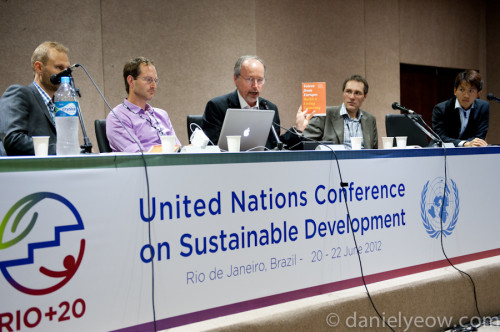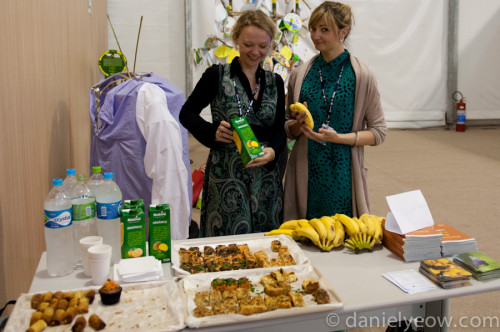Post Trauma
It’s taken a little while to fully decompress, but we seem to have all recovered well from the stress of our official Rio+20 side event. A lot has happened in the time since I last updated.
Big on my agenda of course was the side event that I mentioned before. The “side” events are actually some of the most important things that happen at these conferences, and in all seriousness more actual, measurable results probably come out of the side events than the actual negotiations themselves. Speaking of which…
Earlier that day we ran into some members of the Danish delegation who were actual negotiators and who had literally just stumbled out of the negotiations having finalized the text “The Future We Want”. They also had a copy on hand that we could sit and read through. By now the news of this text has spread all over the world and it is widely recognized as being weak at best, and at worst a complete waste of time. What is perhaps puzzling is that, from everyone I’ve spoken to who was actually in the negotiations, even arriving at this text was a huge uphill battle, and one that was very hard-fought.
Previously I made an analogy that trying to get all the different parties to agree on a text was like trying to get a large group of people on a night out to agree on what movie to watch. Taking this analogy further, imagine that you have a large group of people, many of whom are very insistent on which film they want to see, and some of whom are quite insistent on not watching a film at all. This text is the equivalent to watching a film that everyone has already seen, or perhaps that film but with 20 seconds of extra footage. The reason they were able to agree on it was because everyone was extremely tired, and the text that they finally came up with was in essence very similar to the declaration of 20 years ago, and since all the countries agreed to it 20 years ago, they were like “what the hell, we’ll agree to this, it’s almost the same”.
It’s a little sad that in 20 years we haven’t managed to move very far, but the danger was that if a text wasn’t agreed on, then there wouldn’t be a text for the real conference which actually takes place today and tomorrow won’t have anything to work with. The process of negotiations is a little bit strange in that there’s a bunch of preparatory meetings which end with “prep-com” and by then end of that process there’s supposed to be “a text”. Then the real big guns (ministers, and heads of state from various countries) arrive, quibble over small details, and then sign the document. So prep-com was forced to come up with something, however weak, otherwise it would be up to the ministers and heads of state to agree, which would have been even harder, and in all likelihood, they wouldn’t have come up with anything, and then the whole conference would have been a waste of time.
Although… the language is so weak, that the whole conference really is almost a complete waste of time.
But that’s only if you consider the conference to be the negotiations. Fortunately, these conferences have ballooned into much larger events. There are over 500 side events organized by many different NGOs, government organizations, and other civil society groups. These events present interesting findings, and perspectives on sustainability issues, and perhaps more importantly this part of the conference allows all these passionate and often quite brilliant minds to come together in one place and mix their ideas and passion. Indeed, the connections made during the side events, and all the informal events that also happen during the conference (hanging out at bars, sharing meals at the food court) are truly worth more than the negotiations themselves.
Our side event went well. It was not attended as well as we had hoped for, but when you’re competing with over 500 other side events for attention, and don’t have someone like Bono to speak on your panel, then it can be very difficult to fill the room. My debut as a moderator at UN events went without significant hiccup despite my substantial stressing for most of the days leading up to it. The discussion was quite interesting, and the post-event food was quite wonderful. In keeping with our desire for more sustainability, we managed to source some vegetarian food which was really quite wonderful.
For the rest of the conference I will be keeping myself busy trying to network and also shooting photos and video. Our report was called “Voices from Europe” so I thought it would be appropriate to take video footage with the subtitle “Voices from Rio” in mind, where I interview random people in Rio with interesting stories and try to compile the material into a series of short documentaries. Well… that’s the plan.
The negotiations may be the reason that this whole conference takes place, but they aren’t the most important thing to come out of the conference. It’s easy to get down and to criticize from afar, but the truth is that there are a lot of very talented, well-intentioned people here trying to make the world, and in particular the future world a better place. The main stories that come out in the media relate, predictability, to the negotiations and it’s easy to get very negative about them. So what I’m trying to bring to the table is a more positive message, trying to find the good stories that come out of this conference (and there are many if you look hard enough) and try to give them some exposure.



Leave a comment